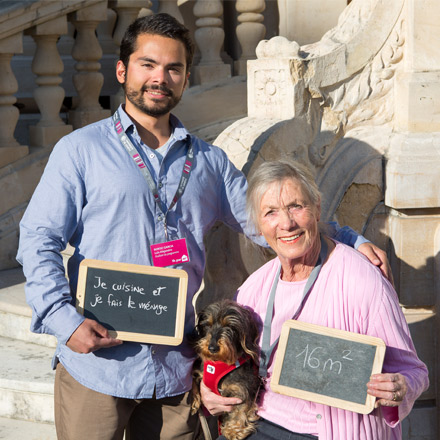The Foundation, committed to reducing the social isolation of the elderly in Geneva
A three-way venture in an innovative programme
In 2016, the BNP Paribas Swiss Foundation, Pro Senectute Genève and the University of Geneva co-founded the programme “1h/m²: a student under my roof”. This new initiative, hosted by the University of Geneva, meets the ambitious objectives of combating the social isolation of the elderly and strengthening intergenerational ties, while helping students to find accommodation in Geneva. The programme thus offers an exchange of space (a room at the owner’s house) in exchange for time and a helping hand: computer help, shopping, DIY, cooking, gardening, conversation in a foreign language, babysitting, etc.

A success story: a combination of rapid growth and real impact
Increasing steadily from 23 student/OAP “tandems” in 2016 to nearly 70 in 2020, the “1h/m2” programme has rapidly become an undeniable success, while close and personalised monitoring has been maintained on each tandem to guarantee quality relationships. By the end of 2020, numbers had risen to a total of 203 young people from all over the world who had been able to experience Geneva in intergenerational lodging with 140 hosts, whose average age is around 75. The programme now offers what amounts to 10% of the rooms managed by the University of Geneva – the equivalent of a small university hall of residence.
Since its launch, the programme has also received continuous media coverage as well as several accolades: the “Cantonal Prize for Sustainable Development” in 2018, the “Youth Prize” of the Youth Parliament in 2019, and in the 2019-2023 Health Promotion and Prevention Plan of the Canton of Geneva, the “1h/m2” programme is mentioned as one of the campaigns to be supported under the heading “Wellbeing and Quality of Life in Old Age” (Action 6.1).
After five years of collaboration, the values, impact and success of this initiative have led the BNP Paribas Swiss Foundation to enthusiastically renew its support for the “1h/m2” programme until the end of 2024.
We hold true to our mission despite the pandemic
In spite of the current pandemic, when the issue of cohabitation between generations has become very difficult, the programme has been maintained with the approval of the Cantonal Head Physician. In fact, several hosts expressed their desire to continue living with their student despite the health risks. “Oh no, you’re not going to take my student away from me! I’ve already had to stop seeing my family!”, a lady of 86 exclaimed, adding that she has enjoyed a good life and is not afraid of dying soon, should that be her fate. Thus, around 40 senior citizens have been able to get through these months of the pandemic by relying on the presence of a young person in their home and the programme has continued to fulfil its purpose of combating social isolation.
“Special support has been set up in response to each situation. When the daughter of a 75-year-old host told her mother that there was no question of hosting a young person three days after a student had moved into her home, the programme helped the girl to find another host.”
Sabine Estier Thévenoz, Programme Manager
Once teaching went fully online, some students decided to leave Geneva, a city that was too expensive for them, and had to be replaced at short notice with hosts who did not want to be left alone.
Enhanced monitoring
The students were given specific advice about the necessary safety precautions. The possibility of moving any student who might fall ill with COVID-19 was planned for, to prevent infecting their host during the quarantine period. Since coursework was undertaken in their rooms, it was sometimes necessary to remind elderly hosts that the student’s presence in their home did not mean that they were always available. Some students also spoke of the fact that this solitary period of work and exam preparation was hard for them.
Finally, thanks to more intense monitoring than usual, around 60 tandems are living through this very singular period of the pandemic together. Because of these changes, the programme has been able to continue the fight against the social isolation of old people who do not wish to be left alone during this pandemic.